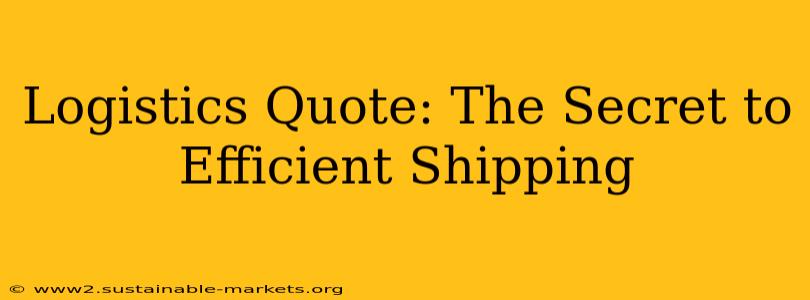Getting a competitive logistics quote is crucial for businesses of all sizes. A well-negotiated quote can significantly reduce shipping costs and improve overall efficiency, impacting your bottom line and customer satisfaction. However, navigating the world of logistics quotes can be tricky. This guide unravels the mystery, providing you with the insider knowledge to secure the best possible deal for your shipping needs.
What is a Logistics Quote?
A logistics quote is a formal document provided by a logistics provider (this could be a freight forwarder, shipping company, or third-party logistics provider - 3PL) outlining the estimated cost and services involved in transporting your goods from origin to destination. It details everything from transportation mode (air, sea, road, rail) and packaging to insurance and potential handling fees. A comprehensive quote offers transparency, allowing you to compare different providers and choose the option best suited to your needs and budget.
Factors Affecting Your Logistics Quote
Several factors influence the final cost of your logistics quote. Understanding these elements empowers you to negotiate effectively and secure a better deal.
1. Type of Goods:
The nature of your goods plays a significant role. Fragile items requiring specialized handling will naturally command a higher price compared to robust, easily-shipped goods. The weight, volume, and dimensions of your shipment are also critical factors influencing the quote. Hazardous materials require specialized transportation and handling, resulting in a higher cost.
2. Origin and Destination:
The distance between the origin and destination points directly impacts shipping costs. Longer distances mean higher fuel costs and potentially longer transit times. Geographical challenges, like remote locations or difficult terrain, can also add to the overall expense. Import/export regulations and customs duties in different countries are additional considerations.
3. Shipping Mode:
Choosing the right shipping mode—air, sea, road, or rail—is crucial for cost optimization. Air freight is the fastest but most expensive, while sea freight is the slowest but often the cheapest option. Road and rail transport fall somewhere in between, depending on distance and infrastructure. The urgency of your shipment and the value of the goods will guide your decision.
4. Insurance and Handling Fees:
Many logistics quotes include insurance to protect your goods against damage or loss during transit. The value of your shipment will determine the insurance cost. Additional handling fees might apply depending on the complexity of the shipment, such as special equipment or requirements for loading and unloading.
5. Incoterms:
Incoterms (International Commercial Terms) define the responsibilities of the buyer and seller regarding shipping costs and risk. Understanding and specifying the correct Incoterms in your request for a quote avoids confusion and ensures accurate pricing.
How to Get the Best Logistics Quote
Obtaining the best possible logistics quote involves strategic planning and effective communication.
- Detailed Information: Provide comprehensive information about your shipment, including weight, dimensions, type of goods, origin, destination, and desired delivery date. The more accurate the information, the more precise the quote.
- Multiple Quotes: Request quotes from multiple logistics providers to compare pricing and services. Avoid selecting the cheapest option solely; consider reliability, experience, and customer service.
- Negotiate: Don't hesitate to negotiate with logistics providers. Highlighting your shipment volume or offering long-term contracts can improve your chances of securing a more favorable rate.
- Review the Fine Print: Carefully review the terms and conditions of the quote, paying close attention to any hidden fees or limitations.
- Clear Communication: Maintain open communication with your logistics provider throughout the process. Any changes to the shipment details should be communicated immediately to avoid unforeseen costs.
Frequently Asked Questions (PAA)
What are the most common mistakes when requesting a logistics quote?
Common mistakes include providing insufficient information, failing to compare multiple quotes, overlooking the fine print, and not negotiating. Accurate and detailed information is key to getting an accurate quote.
How long does it usually take to get a logistics quote?
The time it takes to receive a logistics quote varies depending on the complexity of the shipment and the provider's workload. Expect a response within a few days to a week for standard shipments.
Can I get a logistics quote for multiple shipments at once?
Yes, many logistics providers offer consolidated quotes for multiple shipments. This can lead to cost savings, especially if the shipments share similar routes or characteristics.
What is the difference between a freight forwarder and a 3PL?
While both arrange transportation, freight forwarders primarily focus on the transportation aspect, whereas 3PLs (Third-Party Logistics providers) offer a broader range of services, including warehousing, inventory management, and order fulfillment.
How do I choose the right logistics provider?
Choose a provider based on factors like their experience, reputation, specialization in your industry, insurance coverage, and overall customer service. Check for reviews and testimonials.
By carefully considering these factors and following these tips, you can secure an efficient and cost-effective logistics quote, streamlining your shipping process and optimizing your business operations. Remember, a well-researched and negotiated quote is the secret to efficient shipping.

